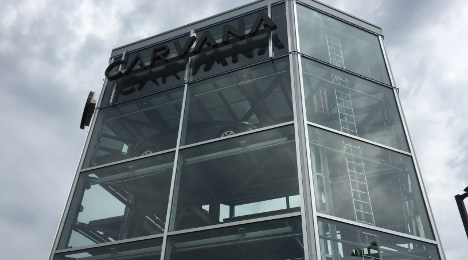Commentary: Inside the vehicle ‘vending machine’

By subscribing, you agree to receive communications from Auto Remarketing and our partners in accordance with our Privacy Policy. We may share your information with select partners and sponsors who may contact you about their products and services. You may unsubscribe at any time.
NASHVILLE, Tenn. –
When it comes to technology, I’m not what you would call an early adopter.
Until December 2013, I was the rare millennial who still had a flip-phone.
But I finally joined the 21st century and got an iPhone for Christmas that year, officially giving up on looking like a “Breaking Bad” extra.
So, the irony is not lost on me that less than three years later, here I am using an iPhone app … to order a car ride … to visit a company that allows consumers to buy cars completely online.
The same smartphone I used to request an Uber to Carvana’s vehicle “vending machine” on Monday, I could have also used to access the Internet and buy a car from the online retailer.
But despite temptation, a vehicle purchase wasn’t the reason for my visit.
Subscribe to Auto Remarketing to stay informed and stay ahead.
By subscribing, you agree to receive communications from Auto Remarketing and our partners in accordance with our Privacy Policy. We may share your information with select partners and sponsors who may contact you about their products and services. You may unsubscribe at any time.
No, I wanted an up-close view of that five-story glass tower off the Nashville, Tenn., highway — one filled with cars and catching glances.
It certainly stirred my curiosity, and that of my Uber drivers taking me from my hotel and back.
It makes perfect sense that one of transportation’s biggest innovators would catch the interest of folks working with another.
But who wouldn’t be fascinated by a contraption that can pull a car down from five stories up and feed it into a mini-garage, making it look as easy as using two quarters to get a Kit-Kat from the breakroom?
What’s more telling is that when you look at the four major (often intersecting) routes of automotive disruption — online sales, autonomous vehicles, connected cars and ride-sharing/car-sharing — much of the traditional auto business model has either come along for the ride or taken the wheel themselves.
And why not? A common goal for these models — whether it’s cars that drive themselves, a more digitized buying process or alternative vehicle usage options — is making life easier for consumers.
I was there as a journalist on a tour and not a purchaser, so “easy” was definitely a takeaway from my Carvana vending-machine visit.
It was a quiet, laid-back atmosphere. Jonathan Greer, the general manager in Nashville, was kind enough to give me the information I needed and show me around. His style was easy-going, consultative.
And to be fair, that’s the same takeaway I got from an April visit to McGeorge Toyota, a Virginia dealership that gives consumers the option to complete all or parts of car-buying online and through home delivery, as a way to make the process quicker and more convenient.
McGeorge Toyota’s digital marketing manager Courtney Taylor said during our interview: “If we can make the car-buying experience easier for somebody, then that’s what we want to do and continue to do.”
And good news for the industry and consumers alike, they’re not the only ones.


